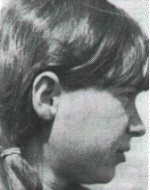Goren, Hannah
Daughter of Isaac and Atka. She was born on the 20th of Tishrei 5751 (20.9.1950) in Mishmar Hasharon, where she studied in elementary school in Mishmar HaSharon, and in all her ways she was far from routine, always in her own special way, with a deep connection and sensitivity to art: music, dance, sculpture and theater. She liked to read poetry books and appreciated artworks, she had a clear aesthetic sense and was meticulous about the Yaffa exterior of everything, even the wrappers of her notebooks and her writing in the school were admirable: the transition to Givat Haim High School was easy for her, Her studies were pleased, but at the beginning of the school period the Six-Day War broke out She asked her, “How many sons will have to sacrifice their lives and how many parents have their sons?” Every news about a fallen soldier affected her and hurt her: One year before the matriculation exams, one of her good friends fell and a difficult crisis passed Her childhood had a great deal of influence on the shaping of her character afterwards, and later on, Hannah refused to compromise with her surroundings and accept orders and laws that the society in which she was educated tried to impose on her and would not be able to compromise with conventions. But even if her opinions were sometimes beyond the norm, everyone around her treated her with love and respect. It was amazing her courage, to walk like this in the face of the current, and to trust her way. She had a lot of personal charm and concentrated the company around her. In the company of adults she would not be bored; she willingly took part in their conversation and knew how to make her Simcha. Hannah had always nurtured the meetings of the family circle and was the driving force behind them. She was drafted into the IDF in December 1968. After completing basic training, she decided to go to Shalhat in the Golan Heights. The parents expressed dissatisfaction with this and she understood their spirit, but did not agree to retract her decision. While she served at the level, she visited the house once a month and was filled with joy when she came. She once expressed her love for life in these words: “Mother, how can you live in a place where there are no children?” Because she lacks only the laughter of the children. She was rich in spirit, knew the joy of life and gave it to her family, to her colleagues, and to everyone she met. She was sensitive to the beauty of nature, especially the natural suits of the different seasons. And so she adhered to love in the landscapes of the homeland. Every stone in the road drew her attention; he loved wildflowers and cultured flowers. Her work in the group of divers in the group was a place of joy and enjoyment. Even the living in nature loved it with love; the black dog and the white kid were the friends of her childhood. Her work experience in the home of the children’s home was the basis for her love of the flock in Givat Yoav. Hannah was a small shepherd, as a child in Sharon, and in her early adulthood – in the wild landscape of the Golan Heights. She died on June 19, 1970. She was laid to rest in the cemetery in Mishmar Hasharon. The IDF commander wrote to the family in a condolence letter: “I never saw such a combination of understanding, kindness, help and consideration for others, with courage, honesty and freedom of thought in speech and action.” After her death, a booklet was published in her memory.
